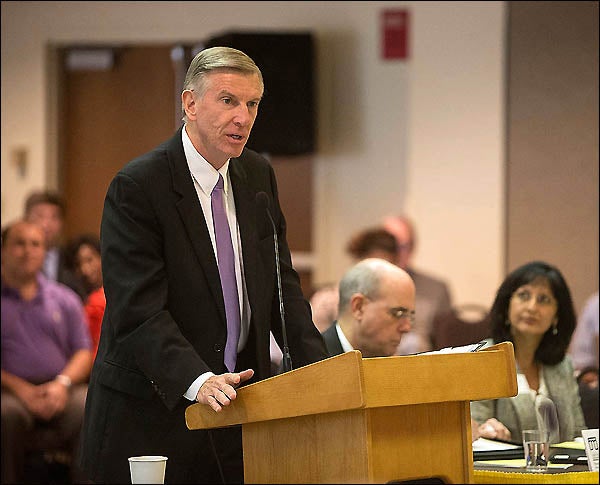LONG-RANGE PLANNING
UNC campuses need to improve graduation rates, Ross tells faculty

UNC President Tom Ross spoke to members of the East Carolina University Faculty Senate Oct. 2, sharing his ideas about the most critical areas of concern for the university’s future planning. (Photo by Cliff Hollis)
Identifying North Carolina’s workforce needs for the coming decade will be the greatest challenge for an advisory committee created to update the UNC system’s long-range plan, UNC President Tom Ross told the East Carolina University Faculty Senate Oct. 2.
Training students for the jobs of tomorrow – jobs he conceded largely don’t exist today—will be difficult and the process requires a sharp focus on students, he said. “We are going to have to improve our (graduation) rate if we are going to produce the workforce of tomorrow,” Ross said.
The UNC Advisory Committee on Strategic Directions was created in September by the Board of Governors at Ross’ request. The 24-member panel is charged with updating the system’s current long-range planning document, titled “UNC Tomorrow,” which was adopted in 2007. ECU Chancellor Steve Ballard was named to the committee, which has broad representation from North Carolina’s higher education and business communities.
A 1972 state law requires the UNC system maintain long-range planning documents and update those plans every five years.
“I think it’s a known fact today that things are different than in 2007,” notably in the state’s ability to adequately fund the UNC system, Ross told the Faculty Senate.
Ross said he will rely on the updated plan when discussing the UNC system’s funding needs with members of the General Assembly. “We can look at ways, perhaps more efficiency ways, to accomplish our goals and then go to the General Assembly and ask for the resources to accomplish those goals.” He said presenting this information to the General Assembly is vital because the November elections likely will lead to the election of many new legislators.
Ross said he wants the long-range planning process to be guided by a set of strategic principles. The principles include setting new degree attainment goals, strengthening academic quality, serving the people of North Carolina, maximizing academic and administrative efficiency and maintaining a financially stable and accessible university system.
“I’ve seen figures that indicate we will need half a million new degree-holding citizens in North Carolina by 2018,” Ross said.
A new policy direction adopted by the Board of Governors links state funding for each UNC campus with graduation rates and other measures of student achievement. Campuses that don’t achieve expected graduation rates will see their enrollments curbed or even reduced.
After assessing the state’s future workforce needs, the advisory committee will recommend degree attainment goals that are responsive to workforce needs and changing state demographics. Ross said the Committee will review and evaluate relevant data and available information in order to present him with a consensus recommendation by Jan. 10.
The committee members are:
- Tom Ross, President, University of North Carolina
- Peter Hans, Chairman, UNC Board of Governors
- Fred Eshelman, Member, UNC Board of Governors
- Phil Berger, President Pro Tempore, North Carolina Senate
- Thom Tillis, Speaker, North Carolina House of Representatives
- Steve Ballard, Chancellor, East Carolina University
- Mahdu Beriwal, President and CEO, IEM
- Peaches Blank, Member, UNC Board of Governors
- Linda Brady, Chancellor, UNC Greensboro
- Jack Cecil, President, Biltmore Farms
- Janet Cowell, State Treasurer
- Keith Crisco, Secretary, North Carolina Department of Commerce
- Lew Ebert, President, North Carolina Chamber
- William Friday, President Emeritus, University of North Carolina
- Paul Fulton, Member, UNC Board of Governors
- Hannah Gage, Immediate Past Chair, UNC Board of Governors
- Frank Grainger, Vice Chairman, UNC Board of Governors
- Robert Ingram, Retired Executive, GlaxoSmithKline
- Leroy Lail, Member, UNC Board of Governors
- Cynthia Marshall, President, AT&T North Carolina
- Harold Martin, Chancellor, North Carolina A&T State University
- Ken Peacock, Chancellor, Appalachian State University
- Art Pope, CEO, Variety Wholesalers
- Scott Ralls, President, North Carolina Community College System
- Catherine Rigsby, Chair, UNC Faculty Assembly; faculty member, East Carolina University
- Jeff Tarte, Health Care Consultant
- Holden Thorp, Chancellor, UNC-Chapel Hill.